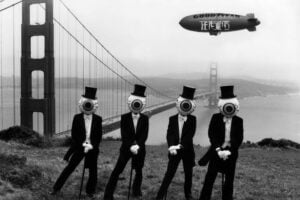
Feature Photo by Tero Vesalainen licensed from Shutterstock
If there was ever a decade when sad pop and rock songs dominated the charts, it was the 1970s. Something about that era seemed to inspire an outpouring of melancholic music that resonated deeply with listeners. Perhaps it was the lingering impact of the Vietnam War, which lasted until 1975, or the disillusionment brought on by the Watergate scandal. Maybe it was just the haze of widespread pot smoking that fueled a generation’s sense of longing and despair. While we often enjoy deep diving into more obscure tracks on these lists, this time, we decided to focus on the biggest, most memorable songs—the ones that left a lasting mark on popular culture. Though we’ve included a few deeper cuts that classic rock fans will recognize, we ultimately chose the songs that managed to depress us all. What a decade that was!
# 10 – Give My Love to Marie – Gene Clark
“Give My Love to Marie” by Gene Clark, from his 1977 album Two Sides to Every Story, is a haunting exploration of the human cost of coal mining, a poignant song that delivers a powerful narrative of hardship, sacrifice, and loss. The track, written by James Talley, stands out in Clark’s repertoire for its deeply emotive storytelling and stark portrayal of life in the Appalachian coal mines. Its lyrics paint a vivid picture of a man on his deathbed, reflecting on a life consumed by labor and suffocating dust, as he sends a final, tender message to his wife, Marie.
Recorded in 1976 at the Record Plant in Los Angeles and produced by Thomas Jefferson Kaye, Two Sides to Every Story captures Gene Clark at a crossroads in his career, balancing between the echoes of his past work with The Byrds and his own path as a solo artist. The song is built on a sparse arrangement that places Clark’s distinctive voice front and center, supported by a mournful pedal steel guitar played by Al Perkins and understated acoustic work by Jeff Baxter. This stripped-down approach amplifies the song’s melancholic tone, allowing the narrative to take precedence and evoking a palpable sense of despair and resignation. This song captures the profound sadness of a man who knows his time is running out.
The narrative of “Give My Love to Marie” is reminiscent of other sorrowful tracks of the 1970s that deal with themes of labor and loss, such as John Prine’s “Paradise,” which also tackles the devastation of mining communities in Kentucky. However, Clark’s delivery imbues the song with a sense of personal urgency and haunting fragility, making it stand out. Lines like “I pray that they never must work in the mine, for the black lung will get them, they’ll die just like me” lay bare the desperation of a man who has seen too much suffering, turning his final breaths into a plea for his children’s futures.
Critically, Two Sides to Every Story did not achieve significant commercial success upon its release, but “Give My Love to Marie” has since been recognized by fans and critics alike as one of the most emotionally potent songs in Clark’s catalog. The song’s impact lies in its heartfelt lyrics and the understated yet powerful arrangement, which highlights Clark’s ability to convey raw emotion with simplicity and grace. It remains a somber yet beautiful piece, a testament to Clark’s artistry, and a fitting opening to any exploration of the saddest songs of the 1970s.
Read More: 10 Best Byrds Songs
# 9 – Hello In There – John Prine
https://www.youtube.com/watch?v=RfwGkplB_sY
# 8 – Long Long Time – Linda Ronstadt
# 7 – Superstar – The Carpenters
“Superstar” by The Carpenters is a haunting ballad of longing and heartbreak that captured the hearts of listeners in 1971, becoming one of the duo’s most enduring hits. Originally penned in 1969 by Bonnie Lynn Bramlett, Delaney Bramlett, and Leon Russell, the song was initially recorded by Delaney and Bonnie. It was then brought to wider attention by Rita Coolidge before Karen Carpenter’s melancholic interpretation turned it into a classic. The Carpenters’ version, released on their album Carpenters in 1971, went on to reach number two on the Billboard Hot 100 in 1972, a testament to its universal appeal and Karen Carpenter’s ability to convey deep emotion with her ethereal, haunting voice.
The Carpenters recorded “Superstar” at A&M Studios in Los Angeles, with Richard Carpenter at the helm as producer and arranger. Richard’s arrangement stripped the song down to its core, emphasizing Karen’s emotive alto vocals and the simple yet lush orchestration that became the duo’s hallmark. The track features Hal Blaine on drums, Joe Osborn on bass, and a delicate touch of strings arranged by Richard himself, all of which contribute to the song’s rich texture and emotional depth. The starkness of the arrangement allows Karen’s voice to shine, embodying the song’s sorrowful narrative of unfulfilled love and longing.
Lyrically, “Superstar” tells the story of a young woman yearning for a distant lover, a rock musician whose promises to return are left unfulfilled. The protagonist’s repeated lament, “Don’t you remember, you told me you loved me, baby?” captures the ache of waiting for someone who will never come back, reflecting the universal experience of feeling forgotten and abandoned. Much like Linda Ronstadt’s “Long Long Time,” another entry on this list, “Superstar” delves into the pain of unrequited love, but where Ronstadt’s song is steeped in introspective melancholy, “Superstar” channels a more outward yearning—a deep, almost desperate plea to a distant lover. The repetitive lyrics, accompanied by the almost mournful guitar and string arrangements, create a powerful sense of longing that makes the listener feel every ounce of the protagonist’s heartache.
Critically, “Superstar” is often celebrated as one of the saddest songs in The Carpenters’ repertoire, and it demonstrates Karen Carpenter’s remarkable ability to convey profound emotion with subtlety and restraint. Unlike the declarative sorrow of John Prine’s “Hello in There,” “Superstar” is more subdued, almost resigned to the reality of unrequited love. The song’s success—peaking at number two on the Billboard Hot 100 and remaining there for two weeks—further solidified The Carpenters’ reputation as purveyors of soft rock ballads with an emotional punch. The song’s enduring popularity can also be attributed to Karen Carpenter’s performance, which combines a delicate vocal delivery with a poignant interpretation of the lyrics, capturing the loneliness and heartache that so many listeners have connected with over the decades.
“Superstar” remains a timeless piece of pop music, demonstrating the Carpenters’ unparalleled ability to take a song and make it their own, transforming it into a deeply moving experience. Its inclusion in this list of the 1970s’ saddest rock and pop songs is well deserved, standing shoulder to shoulder with the likes of “Operator” by Jim Croce and “Long Long Time” by Linda Ronstadt, all of which explore the pain of love that’s lost or unrequited. In every spin of the record, one can still hear the echo of Karen Carpenter’s voice, lingering in the air like a haunting memory.
Read More: Top 10 Carpenters Songs
# 6 – Operator – Jim Croce
# 5 – Diary – Bread
“Diary” by Bread is a quintessential 1970s ballad, weaving a story of heartache and unexpected betrayal with a delicate simplicity that has left listeners reaching for tissues for decades. Released in 1972 as a single from the album Baby I’m-a Want You, “Diary” finds Bread’s lead songwriter and vocalist, David Gates, delivering one of the most poignant love songs of the era. The track, recorded at Elektra Sound Recorders in Los Angeles and produced by Gates himself, features the band’s signature soft rock sound—gentle acoustic guitar, understated piano, and Gates’ emotive vocal delivery. It reached number 15 on the Billboard Hot 100, cementing Bread’s reputation for crafting tender and introspective songs.
In “Diary,” Gates unfolds the narrative of a man who stumbles upon his wife’s diary under a tree, expecting to read affirmations of her love for him. Instead, he uncovers a revelation that cuts to the core: the woman he loves has long longed for someone else. The song’s lyrics poignantly capture the moment of realization with lines like, “The love she’d waited for / Was someone else, not me.” Gates’ ability to convey the shock and sorrow of the protagonist, who grapples with the hidden truth of his wife’s emotions, gives the song its emotional depth. Like John Prine’s “Hello in There,” “Diary” is a masterclass in storytelling, allowing the listener to experience the protagonist’s unraveling world in real time.
Musically, “Diary” is understated, but this simplicity only enhances its emotional impact. The song relies heavily on Gates’ gentle piano melodies and bandmate James Griffin’s restrained yet resonant acoustic guitar work. The soft instrumentation mirrors the vulnerability of the lyrics, while the minimal production keeps the listener’s focus firmly on the unfolding narrative. This restraint is reminiscent of other sad songs from the era, such as Linda Ronstadt’s “Long Long Time,” which also uses minimal instrumentation to amplify the heartbreak at its core. In both tracks, a raw intimacy draws listeners into the depths of the protagonist’s despair.
Critically, “Diary” has often been celebrated for its emotional honesty and Gates’ sensitive songwriting. While Bread is often remembered for their lighter soft-rock hits, this song reveals a depth that resonates with listeners who have ever felt the sting of unrequited love. Unlike some of the more grandiose expressions of loss and sorrow found in other songs of the 1970s, “Diary” is heartbreak told in whispers, where every word is weighted with meaning and every note feels like a sigh. It’s a standout track that embodies the quiet devastation that can come from discovering the painful truths we never saw coming, making it a fitting addition to any list of the decade’s saddest songs.
Read More: The Top 10 Songs From The Group Bread
# 4 – Seasons In The Sun – Terry Jacks
https://www.youtube.com/watch?v=-tPcc1ftj8E
# 3 – Cats In The Cradle – Harry Chapin
“Cats in the Cradle” by Harry Chapin is one of the most poignant narratives in 1970s rock and pop, capturing the bittersweet and often heartbreaking cycle of a father-son relationship marked by missed moments and regret. Released in October 1974 as part of Chapin’s album Verities & Balderdash, this song was recorded at Elektra Sound Recorders in Los Angeles and produced by Paul Leka, who helped frame its folk-rock storytelling style with a gentle acoustic arrangement that complemented its emotive lyrics. The song quickly resonated with listeners, climbing to No. 1 on the Billboard Hot 100 in December 1974 and solidifying Chapin’s reputation as a master of narrative songwriting.
The song’s lyrics unfold in a series of verses that chronicle a father’s relationship with his son over time. Beginning with the birth of his child, the father is often too preoccupied with work and other commitments to spend time with his son. The refrain, “And the cat’s in the cradle and the silver spoon / Little boy blue and the man in the moon,” serves as a haunting reminder of the growing distance between them. The lyrics move through the years, capturing moments when the son yearns for his father’s attention, only to be told, “We’ll get together then.” As time passes, the roles reverse: the father, now lonely in his retirement, finds his son is too busy to visit, echoing his own earlier neglect. The chilling final realization, “He’d grown up just like me,” underscores the tragic irony of a cycle that perpetuates itself across generations.
“Cats in the Cradle” aligns with the themes of other songs on this list, like “Diary” by Bread, which also tells a story of love and connection marred by misunderstanding and regret. However, while “Diary” explores the discovery of unrequited love through a found journal, Chapin’s song focuses on familial relationships’ complexities and neglect’s unintended consequences. Both songs capture a deep sadness rooted in life’s missed opportunities, but “Cats in the Cradle” expands this sentiment into a broader commentary on the passage of time and the pain of lost moments that cannot be recovered.
Critically acclaimed for its lyrical depth and emotional impact, “Cats in the Cradle” has become an enduring anthem for the consequences of a life too focused on ambition and not enough on human connection. It remains one of Chapin’s most recognized and beloved songs, capturing a universal theme that resonates with listeners across generations. Unlike the optimistic tone found in songs like Terry Jacks’ “Seasons in the Sun,” which balances its sadness with a celebration of life’s moments, “Cats in the Cradle” leaves listeners with a sense of melancholy and introspection, urging reflection on what truly matters before it is too late.
Read More: Top 10 Essential Harry Chapin Songs
# 2 – TIE – All By Myself – Eric Carmen / Without You – Harry Nilsson
The number two spot on our list of the 1970s’ saddest rock and pop songs brings us a tie between two emotional powerhouses: Eric Carmen’s “All By Myself” and Harry Nilsson’s rendition of “Without You.” These two tracks, both emblematic of heartache and longing, capture the essence of solitude and loss in their own distinct ways. While they diverge in style and origin, they share a profound emotional core that has resonated with listeners for decades.
“All By Myself,” released in December 1975, was Eric Carmen’s debut solo single after his time with The Raspberries. The song was recorded at The Record Plant in New York and produced by Carmen himself, along with engineer Jimmy Ienner. Built on a hauntingly beautiful piano motif borrowed from Rachmaninoff’s Piano Concerto No. 2, Carmen’s song channels a deep sense of loneliness and longing. Carmen’s vocal performance, moving from the soft, introspective verses to the soaring, cathartic chorus, brings a raw vulnerability to the lyrics: “All by myself, don’t wanna be, all by myself anymore.” The song quickly became a commercial success, reaching No. 2 on the Billboard Hot 100 in 1976, and remains a staple of his catalog. The juxtaposition of classical influences with a rock ballad format helped to cement “All By Myself” as one of the decade’s most memorable expressions of romantic despair.
On the other side of this tie is Harry Nilsson’s “Without You,” a song that brought new emotional depth to an already melancholic piece. Originally penned by Pete Ham and Tom Evans of the British rock band Badfinger, “Without You” was transformed into a global hit when Nilsson recorded it in 1971 at Trident Studios in London, under the production of Richard Perry. Nilsson’s version, marked by its dramatic string arrangements and his soaring, anguished vocals, is often cited as one of the greatest cover songs of all time. His delivery of the lines “I can’t live if living is without you” is nothing short of heart-wrenching, capturing a sense of desperation that seemed to transcend the mere words of the song. “Without You” topped the charts in multiple countries, including the United States, where it held the No. 1 spot on the Billboard Hot 100 for four weeks in 1972.
While “All By Myself” is a personal reflection on the fear of being alone after a romantic relationship ends, “Without You” takes a more dramatic approach, evoking a sense of finality and existential despair. Both songs embody the sadness of separation and unfulfilled love, but where Carmen’s song suggests a quiet, internal struggle, Nilsson’s is a cry of anguish to the heavens. These tracks share thematic ground with other songs on our list, such as “Give My Love to Marie” by Gene Clark, where loss and longing are front and center, but they stand out for their sheer emotional intensity and vocal performances.
Together, “All By Myself” and “Without You” are definitive examples of how the 1970s’ pop and rock scenes grappled with themes of heartbreak and solitude. Both have left an indelible mark on the music world, not just for their chart success but for their ability to tap into a universal human experience, making listeners feel less alone in their own moments of sadness. While they may have tied for the second spot on our list, each song is a master class in conveying the pain and poignancy of love lost.













































Another emotional plea – “Sylvia’s Mother, by Dr.Hook and the Medicine Show.